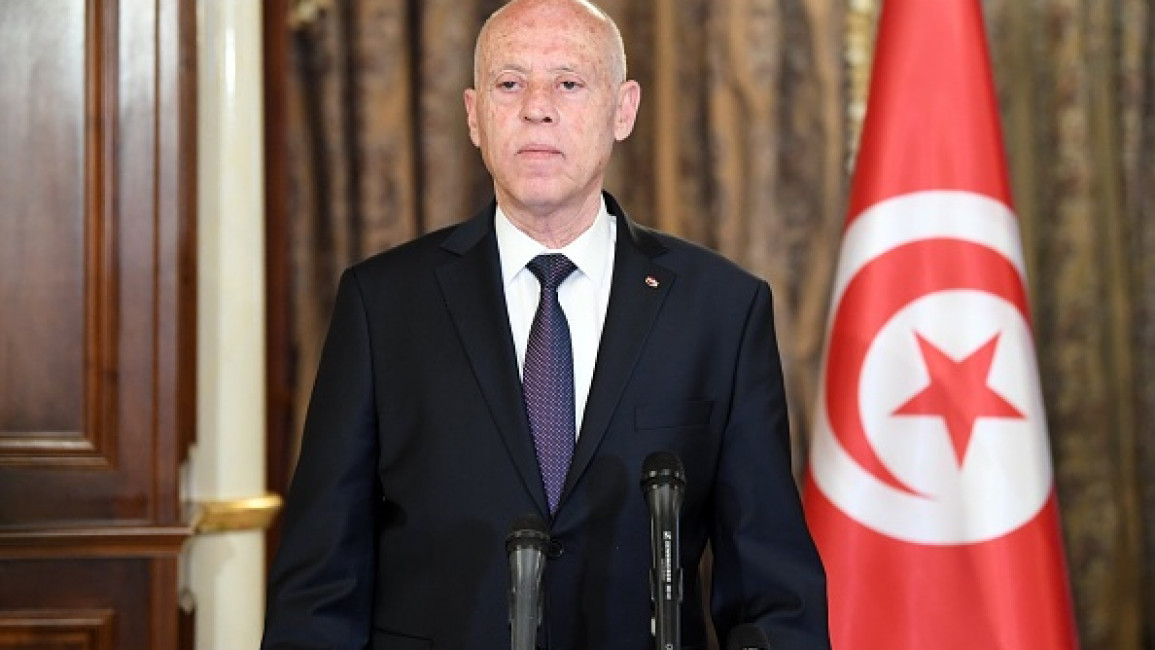
Tunisia president Kais Saied thinks history is on his side
In July 2021 Tunisian president Kais Saied decided to freeze parliament. He revoked his prime Minister Hichem Mechichi and effectively took total control of the executive and legislative branches of power, causing a constitutional crisis.
This power grab was his answer to the frustration brewing in the streets in the face of a worsening economic crisis following the Covid-19 pandemic, as well as the political standstill between the presidency and the main opposition party Ennahda. Other options like dissolving parliament and calling for a snap election were on the table, but Saied nevertheless chose the path of authoritarianism.
In a grandiloquent ten minute long speech, Saied lambasted those “playing with the interests” of the nation and concluded that his actions were in the interest of the many, and that he was prompted by his sense of “historic responsibilities”.
Sound familiar? Many will recall former president Ben Ali’s justifications for overthrowing Tunisia’s first president since its independence in 1956: “This is not a coup, but an act of redress. The law was being flouted, institutions were paralysed”.
''What the president seems either unaware of, or unwilling to consider, is that people’s patience will eventually run out and when that happens, he will be responsible for dragging Tunisia into the abyss of political violence. We need only to look back at the history of the country as an indicator.''
Unsurprisingly, Kais Saied’s autocratic moves were supported by “exemplary democrats” like Saudi Arabia and the UAE. Barely five days after the announcement, the Saudi minister of foreign affairs was already paying a visit to the Tunisian president to show public support. He also received support from Egypt’s dictator Abdel Fattah Al Sisi.
For those familiar with the region, the brutal move was to be expected. The plot for a “constitution dictatorship” had leaked in early May 2021. Furthermore just three months prior to announcing the suspension of the constitution and arresting various opposition figures, Kais Saied had rejected the creation of a constitution court that would have restricted the very action he took.
While some welcomed the decision, others like eminent Tunisian legal scholar Yadh ben Achour and the Association of Tunisian Magistrates, called out the “constitutional coup” as well as the attacks on the independence of the judiciary after the president dissolved the supreme judicial council.
To make matters worse, Saied extended the freezing of parliament in December and granted himself the authority to oversee the Independent High Authority for Elections.
Kais Saied’s boldness in monopolising all power in the aftermath of a popular revolution against dictatorship in 2011, poorly conceals his political archaism. Just like his predecessors, he refused to abide by the rules that were introduced in the wake of the uprisings to avoid a return to authoritarianism.
What the president seems either unaware of, or unwilling to consider, is that people’s patience will eventually run out and when that happens, he will be responsible for dragging Tunisia into the abyss of political violence. We need only to look back at the history of the country as an indicator.
In 1978, then president Habib Bourguiba was faced with the threat of a general strike amidst an economic crisis. He sent in the military who killed over 50 people and wounded hundreds. Just like Kais Saied today seems unable to ‘read the street’, Bourguiba did not address the discontent of the masses and instead doubled down on the repression.
In 1983 then Prime Minister Mohammed Mzali’s authoritarian liberal reforms led to mass demonstrations that began, just like the revolution of 2011, from the heartland and reached the more prosperous coastal regions within months. The army was again sent to crush demonstrators.
Is Saied so arrogant that he thinks he can adopt the same repressive tactics but somehow history will be on his side this time?
As NGO’s called out police repression against journalists and demonstrators, Said’s attempt to calm the opposition was to call for a national dialogue on political reform. This was naturally rebuffed by the once majority party Ennahda and the Tunisian General Labour Union (UGTT).
This crisis did not come from nowhere, Tunisians are justified in their frustration with the elites of their country.
#Tunisia -
— Mourad TEYEB (مــراد التـائـب) (@MouradTeyeb) May 15, 2022
Photos from today's anti #kais_saied protest in #Tunis, the largest since the July 2021 coup:
(1/3)#مواطنون_ضد_الانقلاب pic.twitter.com/qKwHdPQbIf
Ennahda’s time in power was marked by a display of incompetence, sectarianism and even lack of courage in the face of historic responsibilities in the aftermath of the revolution. The party never fully purged the deep state of Ben Ali supporters, a move that would have allowed political renewal amongst representatives. Worse still, after the October 2011 elections, they rehabilitated and even allied with complicit figures such as former senator Chedly Ayari, former secretary of state Habib Essid, and the high ranking official in the ministry of interior, Lotfi Touati.
The rest of the political spectrum has not exactly been in the best position to advance the interests of Tunisians. Nidaa Tounes’s infighting and sham fight against corruption during their time in power discredited their political leadership and in many ways paved the way for Kais Saied to position himself.
There are those who have justified Saied’s power grab by pointing to the instability of the economic crisis the global pandemic and the general political upheavals. Whilst these are all very grave and depressing realities, a year on from the July coup, Tunisians’ economic outlook is no better.
On May Day the UGTT warned that the country “is on the verge of an economic disaster” yet despite undermining the people’s freedoms and selling it to them as a positive step towards alleviating poverty, the president has yet to announce any tangible plan for addressing the economic crisis.
This has all been a disastrous setback for the democratisation process that was initiated by the 2011 revolution.
Kais Saied is proving to Tunisians, yet again, that only they are the guarantors of their own revolution, no leader, no president and no political party will serve as their saviour. The thousands who took to the streets to protest his leadership over the weekend are already taking things into their own hands.
Yasser Louati is a French political analyst and head of the Committee for Justice & Liberties (CJL). He hosts a hit podcast called "Le Breakdown with Yasser Louati" in English and "Les Idées Libres" in French.
Follow him on Twitter: @yasserlouati
Have questions or comments? Email us at: editorial-english@alaraby.co.uk.
Opinions expressed in this article remain those of the author and do not necessarily represent those of The New Arab, its editorial board or staff.




